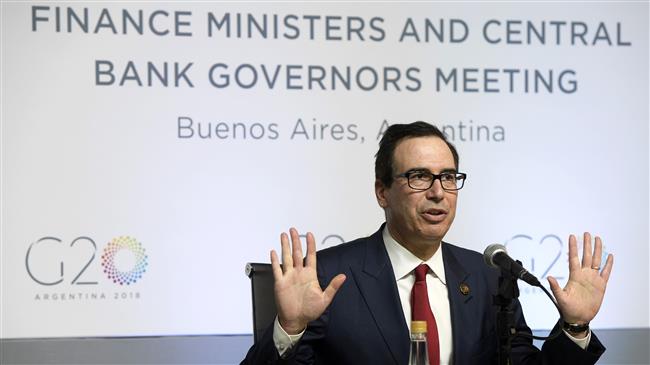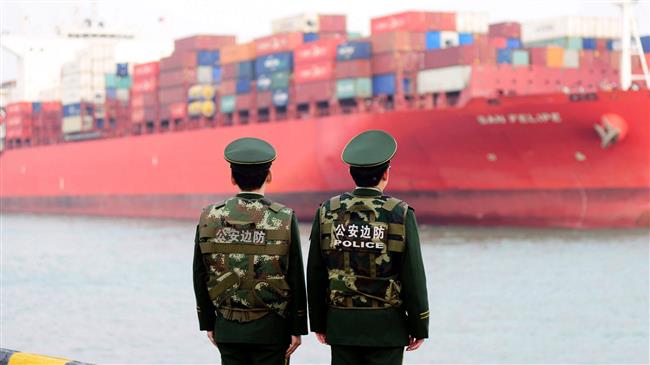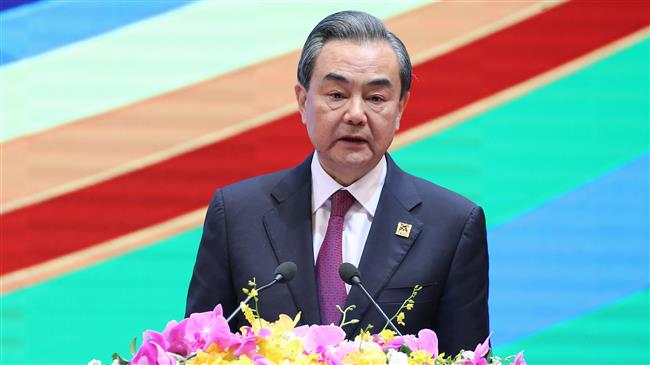US Treasury Secretary warns of possible trade war with China
US Treasury Secretary Steven Mnuchin says there is the potential of a trade war with China as President Donald Trump shows no sign of backing down from a worsening trade confrontation with Beijing, which has also vowed to fight back at any cost.
Mnuchin told CNBC on Friday that "there is the potential of a trade war," while Trump insists on his trade policy and threatening to slap tariffs on an additional $100 billion in Chinese goods.
“There is a level of risk that we could get into a trade war," he added.
Trump said on Thursday that he had directed trade officials to “consider whether $100 billion of additional tariffs would be appropriate. In response China’s Commerce Ministry vowed to retaliate with fresh measures to safeguard its interests if Washington stuck to its actions. .
“We don’t want a trade war but we aren’t afraid of fighting one,” it said.

Mnuchin, however, said the Trump administration is in “communications” with Beijing to avert a damaging escalation of retaliatory tit-for-tat tariffs, and that he was “cautiously optimistic” that the two sides would be able to reach an agreement.
"Right now we have initiated a plan,’ he said. “The tariffs will take some period of time to go into effect. There will be public comment, while we're in the period before the tariffs go on. We'll continue to have discussions.”
Despite being asked repeatedly to clarify the status of “communications,” he said, " We're not going to do this and lay out our negotiations in the public domain."
He went on to explain that Trump is actively involved on a daily basis in the tariff plans with him and US trade representative Robert Lighthizer, saying that the president “wants reciprocal trade.”
“Our objective is still not to be in a trade war,” he added.
Mnuchin remarks about the possibility of a trade war immediately prompted sharp falls in stock markets.

Trump has triggered the trade dispute last month by imposing heavy tariffs on imported steel and aluminum. He signed paperwork enacting tariffs of 25 percent on steel and 10 percent on aluminum during a ceremony at the White House.The move sent shivers through financial markets, caused legal disputes and raised fears that the confrontation could provoke a damaging trade war.
China in retaliation announced plans on Wednesday to impose levies on $50 billion worth of major US exports such as soybeans, cars, and small aircraft. Analysts now warn that the US is more vulnerable to Chinese tariffs on farming and manufacturing than China is to US-imposed tariffs on technology.
Chinese analysts also say the escalation of tariffs is likely to cause more political trouble for Trump than for Beijing because of the differences in the two countries’ governance structures.
According to Shi Yinhong, a professor of international relations at Renmin University in Beijing, “Wall Street is not happy, and this is damaging for Mr. Trump at home.”
Dec. 22: ‘Axis of Resistance’ operations against Israeli occupation
‘Abhorrent’: Oxfam says only 12 trucks delivered aid in North Gaza since Oct.
VIDEO | Leader receives religious eulogists on Hazrat Fatima birth anniv.
Pope Francis slams Israel’s ‘machine-gunning’ of Gaza children
US hostage-taking of Iranian nationals violation of intl. law: Deputy FM
VIDEO | Carol Singers for Palestine on London’s Parliament Square
Ansarullah says ‘Israeli terrorists’ incapable of confronting Yemen, warns of secret weapons
VIDEO | Yemenis praise the military for its successful operations against Israel













 This makes it easy to access the Press TV website
This makes it easy to access the Press TV website